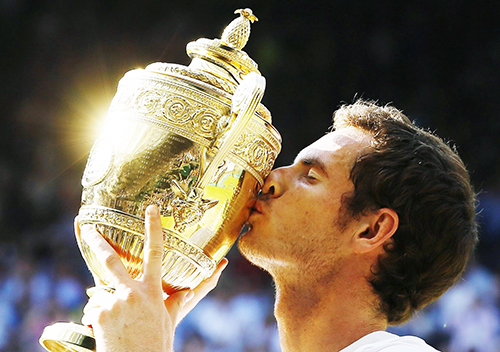Andy Murray walked onto Centre Court as the statistical underdog in the Wimbledon final on Sunday. His opponent for the afternoon was Novak Djokovic, the world’s top-ranked player by a reasonable margin and winner of six major titles to Murray’s one. Djokovic had taken 11 of their 18 matches overall, including their most recent meeting, a four-set victory in the final of the Australian Open in January.
Murray makes history at Wimbledon

Andy Murray walked onto Centre Court as the statistical underdog in the Wimbledon final on Sunday. His opponent for the afternoon was Novak Djokovic, the world’s top-ranked player by a reasonable margin and winner of six major titles to Murray’s one. Djokovic had taken 11 of their 18 matches overall, including their most recent meeting, a four-set victory in the final of the Australian Open in January. The tournament had already seen some staggering upsets—Rafael Nadal’s loss in his opening match and defending champion Roger Federer’s exit a round later—but Djokovic had survived, navigating through six challengers with the elastic movement and ruthless efficiency that have come to define the sport over the last few years.
Of course, the stats had nothing to do with the uphill slog that Murray was scheduled for at the All England Lawn Tennis Club that day. Murray, who hails from Dunblaine, Scotland, has long been something of an outsider at his “home” tournament. He has a history of surly exchanges with the British press, especially on the subject of his nationality, and travels with a coach, Ivan Lendl, who might be called surly on the best of days if you were feeling particularly generous. “British when he wins, Scottish when he loses,” the adage goes, and yet it has done nothing to curb the media assault that Murray steps into every year when his name is announced in the draw in London, because Fred Perry was the last British man to win the men’s singles title at Wimbledon. In 1936.
So it was understandable when the crowd failed to suppress a premature and thoroughly feral screech as Djokovic’s match-point return floated toward the baseline, astonishing that they managed to snuff it out all at once when the ball dropped well inside the chalk, and downright cathartic when they bellowed out in a deafening collective exhale as the Serbian’s next backhand hit the tape and fell back on his side of the court. Their timbre was unmistakable—it sounded exactly like relief.
The rest of the show played out like any other year. Murray immediately dropped his racket, tossed his cap to the ground and screamed up at his assembly of family, coaches and guests until he was forced to take a breath. He turned back and jogged over to embrace Djokovic, then was left on court by himself to absorb the applause. He sunk to his knees, shuddering; started to cry and then thought better of it; took a victory lap around the stadium; climbed into the stands where his mother was waiting; and climbed back down again for the trophy ceremony. Djokovic was graciously brief in his runner-up speech, and Murray was droll and self-deprecating as he allowed himself to be led through an unimaginative interview that was designed to hit all the relevant talking points.
But this was not like any other year, and the ostensibly routine 6-4, 7-5, 6-4 win was anything but—and the subtle upturn in the corners of Ivan Lendl’s mouth as he watched his pupil drop decades of baggage at the door was as close as you’ll come to the Rapture within the confines of a southwest London tennis club. The Scotsman who once told a reporter it was his dream to win the U.S. Open is now the defending champion at the most important tournament in the world for a fan base that waited 77 years to see a local’s name etched on the trophy. Whether he likes it or not, Andy Murray is officially British.






Love the punchline!